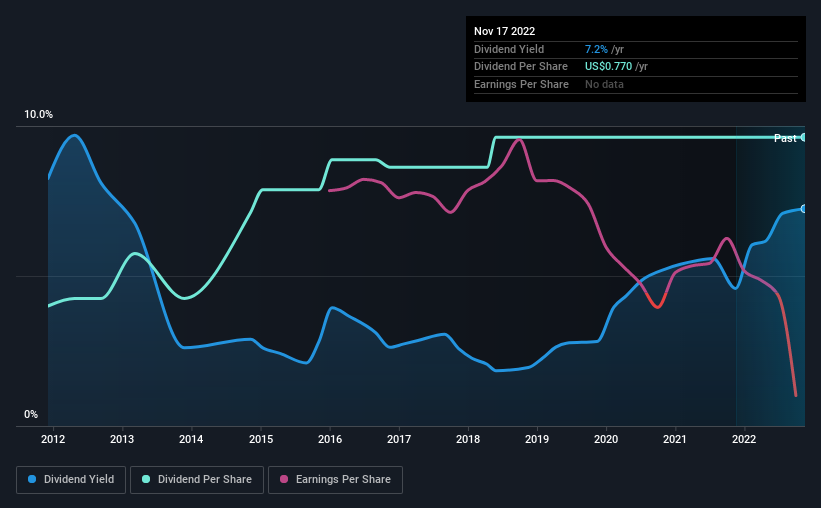
The board of Universal Insurance Holdings, Inc. (NYSE:UVE) has announced that it will pay a dividend on the 16th of December, with investors receiving $0.29 per share. Based on this payment, the dividend yield on the company's stock will be 7.2%, which is an attractive boost to shareholder returns.
View our latest analysis for Universal Insurance Holdings
Universal Insurance Holdings Is Paying Out More Than It Is Earning
If the payments aren't sustainable, a high yield for a few years won't matter that much. Even though Universal Insurance Holdings isn't generating a profit, it is generating healthy free cash flows that easily cover the dividend. We generally think that cash flow is more important than accounting measures of profit, so we are fairly comfortable with the dividend at this level.
Earnings per share is forecast to rise by 109.6% over the next year. However, if the dividend continues along recent trends, it could start putting pressure on the balance sheet with the payout ratio getting very high over the next year.

Dividend Volatility
While the company has been paying a dividend for a long time, it has cut the dividend at least once in the last 10 years. The annual payment during the last 10 years was $0.32 in 2012, and the most recent fiscal year payment was $0.77. This implies that the company grew its distributions at a yearly rate of about 9.2% over that duration. A reasonable rate of dividend growth is good to see, but we're wary that the dividend history is not as solid as we'd like, having been cut at least once.
The Dividend Has Limited Growth Potential
With a relatively unstable dividend, it's even more important to evaluate if earnings per share is growing, which could point to a growing dividend in the future. Over the past five years, it looks as though Universal Insurance Holdings' EPS has declined at around 49% a year. Dividend payments are likely to come under some pressure unless EPS can pull out of the nosedive it is in. Over the next year, however, earnings are actually predicted to rise, but we would still be cautious until a track record of earnings growth can be built.
Universal Insurance Holdings' Dividend Doesn't Look Sustainable
Overall, we don't think this company makes a great dividend stock, even though the dividend wasn't cut this year. The company is generating plenty of cash, which could maintain the dividend for a while, but the track record hasn't been great. We don't think Universal Insurance Holdings is a great stock to add to your portfolio if income is your focus.
Market movements attest to how highly valued a consistent dividend policy is compared to one which is more unpredictable. At the same time, there are other factors our readers should be conscious of before pouring capital into a stock. For instance, we've picked out 1 warning sign for Universal Insurance Holdings that investors should take into consideration. Is Universal Insurance Holdings not quite the opportunity you were looking for? Why not check out our selection of top dividend stocks.
New: AI Stock Screener & Alerts
Our new AI Stock Screener scans the market every day to uncover opportunities.
• Dividend Powerhouses (3%+ Yield)
• Undervalued Small Caps with Insider Buying
• High growth Tech and AI Companies
Or build your own from over 50 metrics.
Have feedback on this article? Concerned about the content? Get in touch with us directly. Alternatively, email editorial-team (at) simplywallst.com.
This article by Simply Wall St is general in nature. We provide commentary based on historical data and analyst forecasts only using an unbiased methodology and our articles are not intended to be financial advice. It does not constitute a recommendation to buy or sell any stock, and does not take account of your objectives, or your financial situation. We aim to bring you long-term focused analysis driven by fundamental data. Note that our analysis may not factor in the latest price-sensitive company announcements or qualitative material. Simply Wall St has no position in any stocks mentioned.
About NYSE:UVE
Universal Insurance Holdings
Operates as an integrated insurance holding company in the United States.
Solid track record established dividend payer.

